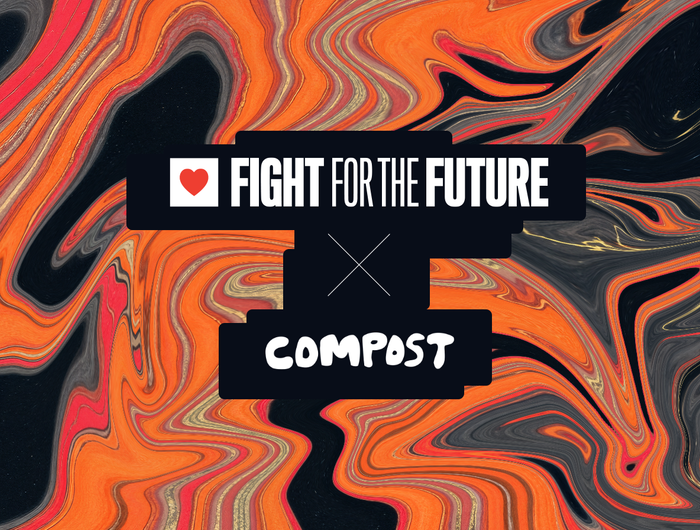
FOREWORD
Lia Holland and mai ishikawa sutton
Hello and welcome to this special issue of COMPOST!
We’ve partnered with Fight For the Future1 to publish this toolkit for creators who want to write more dynamic stories that challenge mainstream tropes of surveillance technologies used for fascist repression.
Surveillance technologies in our culture today are a perfect example of narrative disorder as imagined in an eponymous short story2 from one of our toolkit contributors — a condition created when we consume so many homogeneous narratives that it becomes difficult to differentiate between that homogeneous narrative and our lived experience. Unfortunately, the surveillance narrative in a vast majority of fictional works could be from the press release of a facial recognition AI company: that surveillance tech actually works, that it’s ready to replace humans in a wide range of jobs, that only the “good guys” will use it, and that more surveillance means more safety.
But safety for whom?
In the real world, surveillance tech is Hungary’s tool of choice to try and identify everyone who participates in Pride3; law enforcement in the US use it to jail marginalized people4 the tech regularly misidentifies and to supercharge the disappearances5 of political dissidents; Israel uses it to generate6 and carry out AI-assisted drone assassinations7. Much of this tech is snake oil — but when it works, it’s devastating for human rights. Decisions about whether these technologies come into our communities are being made by the rich and powerful. And this is all done with the complicity of storytellers8 writing free propaganda for the mega corporations and governments intent on Orwellian control of every facet of our lives.
The vendors of surveillance technologies pour untold sums of money into aggressive marketing of their products. Here is a clap back. This toolkit of anti-surveillance stories, reactions, analysis, and incitement was built by privacy activists and human rights experts, in collaboration with Strange Horizons as well as the DWeb Camp, DragonCon, and RightsCon communities.

Short for commons post, COMPOST is a magazine publishing text and multimedia works that explore the web as a digital commons. It’s a project to manifest a small corner of the web that invites creative expression built with care and mutual support. This issue of COMPOST will look different from the others we’ve released, but its contents reflect the same essence — in processing our relationship with networked technologies in a way that’s approachable, intimate, and grounded in lived experience. For many who are challenging the violent supremacies in their societies, that relationship is treacherous. It can even be fatal. And it’s become impossible to deny the interrelatedness between the centralized, monopolistic control of the internet, the ecological harms of wasteful infrastructure, and the rising tide of authoritarianism worldwide.
In their analysis of the story Crisis Actors, Lia writes:
Stopping surveillance tech and fighting copaganda is not just about hackers hacking and programmers programming. It’s about what the message is, how it is made to resonate, and generating enough cultural momentum to overthrow oppression — despite and because of the fact that the more perfect a machine becomes, the more distant it grows from the human experience.
Our inescapable humanity is a frailty and a strength: we will always be vulnerable because we want love and to love, and you can never code our desire for connection out of the panopticon. But you can use this beautiful flaw to bring it down.
We encourage you to read the stories selected from our call for short fiction along with the analysis, as they are all excellent examples of the types of works that resist surveillance tech copaganda. And please share this toolkit with the other storytellers and creators in your life! It will truly take all of us to curb the dominance of the toxic narratives that normalize the use of technologies for centralized, fascist control.
As Lia writes in our resources and appendices, leaning on a favorite well-worn concept of finding “new thoughts to think with” that they gleaned from the writings of Professor Donna J. Haraway:
There is a deep well of liberal angst that is a movable force in the arts industries. We aspire to have this toolkit influence what stories these folks choose to move forward. That change happens through changing cultural expectations, and you, the storytellers, are makers of culture.

How this toolkit was created
The creation of this toolkit took place over a year, from Spring 2024 through Spring 2025. It was produced and edited by Lia Holland, Author9 and Campaigns and Communications Director at US-based digital human rights organization Fight for the Future, and supported by our friends at the Filecoin Foundation for the Decentralized Web. mai ishikawa sutton joined the project as an editor and publisher at its outset. mai is a Senior Organizer with DWeb, lead editor and founder of COMPOST magazine, and an independent writer, editor, and organizer10 working at the intersection of technology, social solidarity economy, and the digital commons.
After enthusiastic encouragement from the core leadership team at RightsCon11, the world’s largest tech and human rights conference, and dedicated collaboration with RightsCon’s Luis Eduardo Marquez Garrido, Lia and mai took the idea to the 2024 DWeb Camp in Navarro, California. There, participants brainstormed tips, themes, guidance, and prompts that would inform our forthcoming ask of the global short story community.
With the participation of Strange Horizons12, as well as judges Yudhanjaya Wijeratne, Chen Qiufan (Stanley Chan), T.R. Napper, Seanan McGuire, and DongWon Song, StopCopaganda.org was launched during DragonCon 2024 in Atlanta, Georgia, where panelists in the Electronic Futures Forum track held a discussion of the project and its themes.
The call for short stories received 120 anonymized submissions and a dozen stories were shortlisted. Five were selected to be published in a special issue of Strange Horizons in January 2025 and used as toolkit creation prompts for a group of over 100 human rights and technology experts at RightsCon 2025 in Taipei, Taiwan.
These five stories are those that appear in this toolkit alongside images and designs from Vasjen Katro13, who also designed the beautiful graphics for the StopCopanda.org14 site. The collected analysis and incitement comes primarily from three working sessions at RightsCon, but also from various discussions across the year with project collaborators. Author Christopher R. Muscato was selected by judges to attend RightsCon and help lead the sessions there. His support, and the support of countless other people throughout this creative challenge, has been invaluable.
This toolkit is published via the World Wide Web through Sutty15, and is published on the Decentralized Web using its integration with Distributed Press16. That means you can access this toolkit as a typical HTTP website, as well as through InterPlanetary File System (IPFS)17 and Hypercore18. What does that do? By publishing through these additional protocols, we’re reducing reliance on a single point of failure and increasing the longevity of this toolkit across diverse networks. Essentially, we’re making it much less possible for it to ever go offline, over technical failures or even political pressure. Our plan was to publish it this way from the get go, to embody the kinds of distributed technologies that we’ll need to resist repression in the real world.

- https://www.fightforthefuture.org/ ↩︎︎
- https://firesidefiction.com/narrative-disorder ↩︎︎
- https://apnews.com/article/hungary-pride-ban-orban-lgbtq-rights-e7a0318b09b902abfc306e3e975b52df ↩︎︎
- https://innocenceproject.org/news/when-artificial-intelligence-gets-it-wrong/ ↩︎︎
- https://www.techpolicy.press/trumps-social-media-surveillance-social-scoring-by-another-name/ ↩︎︎
- https://www.theguardian.com/world/2024/apr/03/israel-gaza-ai-database-hamas-airstrikes ↩︎︎
- https://www.accessnow.org/publication/artificial-genocidal-intelligence-israel-gaza/ ↩︎︎
- https://www.businessinsider.com/google-tv-movie-hollywood-boost-tech-image-hundred-zeros-2025-5 ↩︎︎
- https://liaholland.com ↩︎︎
- https://maisutton.net/ ↩︎︎
- https://www.rightscon.org/ ↩︎︎
- http://strangehorizons.com/ ↩︎︎
- https://www.instagram.com/vasjenkatro/ ↩︎︎
- https://www.stopcopaganda.org/ ↩︎︎
- https://sutty.nl/ anyone can try out the Sutty CMS to publish your website on the World Wide Web and Decentralized Web. We encourage you to give it a try. :) ↩︎︎
- https://distributed.press/ ↩︎︎
- https://ipfs.tech/ ↩︎︎
- https://github.com/holepunchto/hypercore ↩︎︎
















